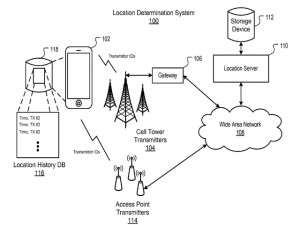When Apple eventually deigned to respond to the furore about iPhones logging location data, it issued a PR-mediated statement so slippery that it practically slid off the monitor. But it did contain one apparently unequivocal statement:
“Apple is not tracking the location of your iPhone. Apple has never done so and has no plans to ever do so.”
Oh, yeah? Consider Exhibit A:

It comes from a patent application entitled “Location Histories for Location Aware Devices” which Apple filed in September 2009.
(Thanks to Leander Kahney for the patent link.)
A location aware mobile device can … collect network information (e.g., transmitter IDs) over time. Upon request by a user or application, the network information can be translated to estimated position coordinates … of the location aware device for display on a map view or for other purposes. A user or application can query the location history database with a timestamp or other query to retrieve all or part of the location history for display in a map view.
Here’s how TechDirt tells it:
Apple’s key points are:
Apple (not researchers, or tons of other people who have noted this “bug” for a year or so) “discovered” a bug with location data on the phone:
The reason the iPhone stores so much data is a bug we uncovered and plan to fix shortly
There’s no tracking going on. There’s nothing to see here.
Apple is not tracking the location of your iPhone. Apple has never done so and has no plans to ever do so.
Even though there’s no tracking and nothing to see here, it’s still a bug which will be fixed.
The reason people are concerned about this is because people are confused.
Got that? People are confused and there’s nothing to see here, but Apple has discovered a minor bug which will be fixed.
There’s a staggering level of hypocrisy here which is par for the course for Apple. It’s a bit like the old newspaper mantra in the glory days of print: “Never apologise, and never explain.”
Except that it won’t wash any more. And the strange thing is that we get this crap all the time from companies that are supposed to be, well, 20th-century organisations. Matthew Ingram had a good post about this on GigaOM in which he looked at the way Sony and Amazon as well as Apple have displayed a steam-age sense of responsibility in an online age:
Given its past behavior, it’s possible that Apple is beyond help in this area. The company’s approach seems to be that people will unfailingly line up to buy its products regardless of how it handles such PR gaffes, so it may be a lost cause. But Amazon and Sony arguably have a lot more to lose.
Sony in particular — a former technology leader — has not been doing well on a number of fronts for years now, as Apple has taken over virtually every market segment that the technology company used to own. Not only that, but the company is already infamous in computer security circles for its last major fiasco in 2005, the “Sony rootkit” affair, in which users had a virus-like software program installed on their computers without their knowledge if they played a CD. So you might think that the company would try hard to get out in front of the most recent issue — which venture investor and technology analyst Paul Kedrosky described as “among the worst such debacles in modern financial/technical history” — as quickly as possible. Oh, but it’s really complicated too.
Amazon is not nearly as desperate as Sony, but the company has still pinned a lot of its hopes for the future on the success of its cloud-hosting and cloud-based services business, and seeing hundreds of major companies and websites fail — and lose critical data — is a huge issue. And yet, while Amazon eventually did release something that was much closer to an actual apology than anything Sony or Apple came out with, the company still avoided discussing the issue for what seemed like an eternity in Internet time. One Internet analyst said that Amazon’s “anemic public response” was a major flaw, and that arguably wasn’t the only one.
This isn’t an issue just for Apple, Sony and Amazon — it’s something that companies of all kinds are still struggling to deal with. The reality is that social media such as Twitter and Facebook have increased the ability of customers and users to speak out about such issues, and decreased the amount of time that companies have to deal with them. And that means the old approach of taking days to hold “war room” meetings and come up with elaborate PR plans just doesn’t work any more.
Those things still have to be done, but they have to be done a lot faster.
Yep. Matthew also provides a link to a fascinating diagram summarising the USAF’s “Rules of Engagement for Blogging” from which companies could learn a thing or two.



